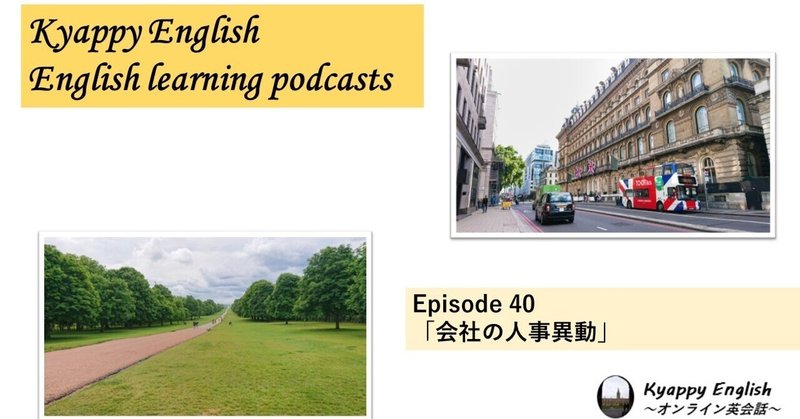
Episode40 会社の人事異動
Introduction:
"Hello, and welcome to my English learning podcast. Today's theme revolves around ' Company Personnel Changes’. As we delve into the intricacies of Human Resources reshuffling in Japanese companies, let's explore the traditions, trends, and perspectives that shape this practice.
Small Discussion Question 1:
"Let's start with our first question: How do you see Human Resources reshuffle in Japanese companies?
Sample Answer 1:
I would say this is a bit old-fashioned in the modern and global working context, where productivity and efficiency matter. Frankly speaking, it’s quite intimidating and formidable when the HR reshuffle season is around the corner. I vividly recall being transferred to subsidiaries in an Asian country five years ago, even though I couldn't speak the local language at that time. There was another catch; I had been a salesperson, but I was asked to take on the role of an HR manager in the country.
Small Discussion Question 2:
What factors do you think contribute to this trend? "
Sample Answer for Question 2:
"It's a long-standing custom, you know, aimed at cultivating versatile skills capable of handling diverse roles. The belief is that this practice benefits the company. Their goal is to transform employees into generalists equipped with versatile skills, as it is believed that being such a staff member can pave the way for a promising career.
Let’s see today’s vocabulary.
When something is described as ‘old-fashioned(やり方などが古い)’, it means it is not in style or no longer considered modern. For example, “Despite the technological advancements, some people still prefer the old-fashioned handwritten letters.”
Our next word is 'intimidating(恐るべき、恐ろしい).' If something or someone is intimidating, it creates a sense of fear or apprehension. For instance, “Speaking in public can be intimidating for many individuals, but with practice, it becomes more manageable.”
Moving on, we have the term 'formidable(恐るべき、手ごわい).' Formidable describes something or someone that evokes respect and fear due to their impressive qualities or abilities. For example, “The team faced a formidable opponent in the championship, known for their exceptional skills.”
Next, we’ve got the phrase 'long-standing(長く続く).' When something is long-standing, it has existed or persisted for a significant amount of time. For instance, “The two friends have a long-standing tradition of meeting for coffee every Sunday morning.”
Pave the way:
Lastly, we have the expression 'pave the way(道を拓く).' This phrase means to prepare the groundwork or create favorable conditions for something to happen. For example, “His groundbreaking research paved the way for future advancements in the field of medicine.”
Conclusion:
Thank you for listening. Stay tuned for our next episode!
ビジネス英語の教材は以下もどうぞ!!
この記事が気に入ったらサポートをしてみませんか?
